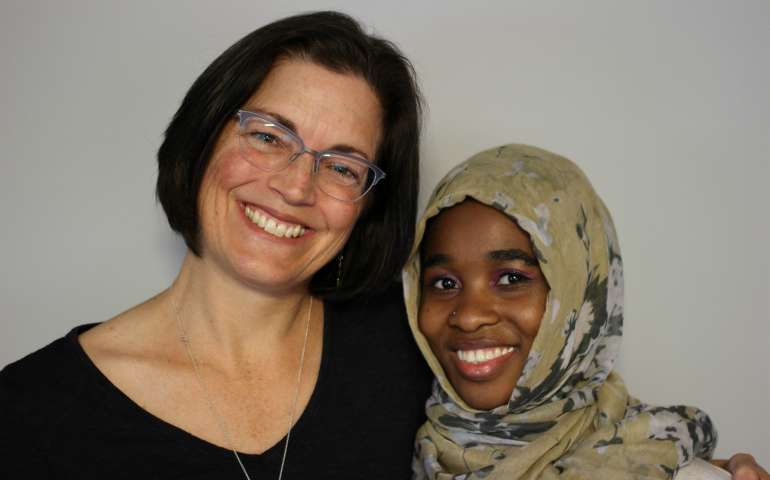
The author Marybeth Christie Redmond, left, and Madina Dhahir Haji
My anxiety for our country deepens into heartache as I contemplate the executive order that targets Syrian refugees asking to resettle here. One hundred of them, fleeing bombs and terror, are just days away from immigrating to my home state of Vermont. As I write this, it's unclear whether their passage to new life is delayed or canceled for good.
My attention turns to the Somali-Bantu family that my husband and I hosted in our home 12 years ago. I pick up the phone to text the eldest child, Madina Dhahir Haji, eager to touch base. They are devout Muslims with extended family members still emigrating, so I wonder what she and her household must be experiencing during this time of presidential blitzkrieg. Somalia is one of the seven majority-Muslim countries singled out in the travel ban issued by executive order Jan. 27 and in the revised order March 6 that removes Iraq from the list.
Madina, 21, came over to our house, dropping off her youngest brother for his tutoring session with my husband, Mark. We sat on stools in the kitchen, sipping hot chocolate with dollops of whipped cream.
"How are you handling this?" I asked her.
"I am so angry and confused," she confided. "This is not the America I thought it was."
She confirmed that several extended family members have been forced to cancel their long-awaited departures from Kakuma, the Kenyan refugee camp where Madina herself came from.
"Some of my father's family," she added. "I think they were hoping to go to Missouri, but I'm not sure what will happen now."
Madina shared repercussions of this executive decision that are closer to home. This week, as she sauntered up the driveway of her Essex home, just 1 mile from mine, a carload of men yelled bruising obscenities as they sped by.
"Maybe they were reacting to my covered head," she said. "I don't know. I was scared."
Madina has been on the receiving end of hateful behavior before, while riding the public bus or attending school, being told "you smell" and "go back where you came from." Having to endure such abuse on one's home ground seems exponentially cruel. It's a wake-up call for me, a white privileged woman who lives largely insulated from this kind of hate and marginalization in our shared town. This, in progressive Vermont, the land of Bernie Sanders.
Madina was the very last member of her immediate family to become an American citizen, a few months before the election last November. She had asked me pointedly about the presidential election and what outcome I thought might result. Like so many others, I saw the race tightening but couldn't imagine that Hillary Clinton wouldn't prevail. I downplayed Madina's concerns about a possible "wall," worsening anti-Muslim rhetoric, changes to immigration, all of it.
Thankfully, Madina prioritized her citizenship and took the oath of allegiance to "support and defend the Constitution" last August. The day after the ceremony, she texted us an iconic photo of her standing in a courtroom next to a judge, an American flag behind them as backdrop. Dressed in flowered hijab with the ends tied stylishly around her neck, she held her certificate of naturalization with beaming pride. Her soulful eyes and shining smile competed for brilliance.
Madina and her family had come to our largest city, Burlington, as refugees in 2004. My husband, toddler son and I waited at the airport as a stoic woman, her mother, Zahara, dressed in colorful African dress, came through the arrivals' door with a baby knotted to her back, with four other youngsters, ages 3, 5, 7 and 9, trailing behind in oversized Keds supplied by the resettlement agency. At the last moment, Zahara's husband had opted to remain in the Kenyan refugee camp where she had borne each of her children. So she came alone, as a single mother, to Vermont, a name that meant nothing other than a safe land where her children might know a future.
The family carried a few handbags containing everything they owned, including a couple pieces of gold jewelry and some clothes. We offered them bananas and mangoes, recognizable food and gestures of friendship, and communicated through exaggerated hand signals for the week they lived in our home. The very first night I descended the stairs of our finished basement to check on the family, I found all six asleep together on the queen mattress, legs and arms intertwined as one. The other beds in the room were untouched.
We later helped them settle into their Burlington apartment and outfitted each one for the impending winter. I envisioned my primary relationship with Zahara, but it became clear that Madina, age 9 at the time, would serve as the bridge. She was wiser than her years, already functioning as her mother's translator, caregiver of siblings, and family navigator through this strange new world of grocery shopping, doctor appointments and being on time.
Through the years, Madina would become a beacon for me, someone who teaches me about the gorgeousness of human dignity despite the odds. While her mother had to keep focus on survival, Madina came to America with a spaciousness of soul, ready for friendship and engagement. She has delighted participating in aspects of American culture such as dressing up as Hannah Montana to trick or treat at Halloween, while also honoring her roots, each foot firmly planted in a distinctive world.
Madina is now a junior at the University of Vermont, studying education to become a middle school teacher who works with English language learners new to this country, as she once was. Like the best of Americans, she wants to give back. She balances a full course load while working as a cashier at Sears 30 hours per week. (Her siblings are all at various stages of their education, and each one that turns age 16 gets a job to contribute income.)
I can hardly imagine my life without this most enriching of relationships. Madina shows me what boundlessness, persistence and resilience look like every day. I think of the adolescents she will guide in her classroom soon and how fortunate they will be to tap her deep knowledge of the immigrant journey.
Madina, a new American, makes me want to be a better American. Our nation will be a richer, more compassionate place because of the generous gifts she has brought to its altar.
[Marybeth Christie Redmond, a writer-journalist, is co-editor of Hear Me, See Me: Incarcerated Women Write, a compilation of the poetry and prose of Vermont's incarcerated women.]




